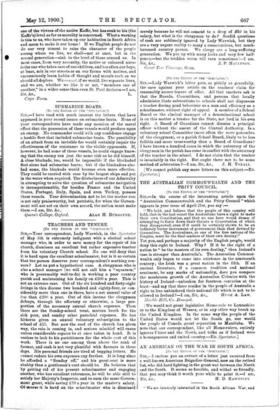THE AUSTRALIAN COMMONWEALTH AND THE PRIVY COUNCIL
[TO THE EDITOR OP THE "SPECTATORM
SIR,—In the course of the interesting article upon the "Australian Commonwealth and the Privy Council " which
appears in your issue of April 21st, you say :- " We hold, and believe that the people of this country will hold, that in the last resort the Australians have a right to make their own Constitution, and that no one here would dream of attempting to force down their throats a Constitution of which they disapproved, even if it could be certainly shown to be an infinitely better instrument of government than that devised by themselves. The Australians, as one of the free nations of the Empire, must be the final masters of their own destiny."
Yet you, and perhaps a majority of the English people, would deny this right to Ireland. Why ? If it be the right of a nation to " be the masters of its own destiny," then Ireland's case is stronger than Australia's. The Australian Common- wealth only began to come into existence in the nineteenth
century; the Irish was a great nation in the fifth. If an ancient literature, if a common tradition and national sentiment, be any marks of nationality, dare you compare the mushroom growth of the Australian Colonies with the history of Ireland—unbroken for fourteen centuries at the least—and say that there reeides'in the people of Australia a right to live unhindered their national life which is not to be allowed to Ireland ?—I am, Sir, &c., Huon A. Law.
Marble Hill, Co. Donegal.
[We would not grant legislative Home-rule to Lancashire or to the Kingdom of Wessex, or in any other way break up
the United Kingdom. In the same way the people of the United States would not let the South go, nor would the people of Canada grant separation to Manitoba. We note that our correspondent, like all Home-rulers, entirely ignores Ulster and the North, and talks as if Ireland were
a homogeneous and united country.—ED. Spectator.]






































 Previous page
Previous page